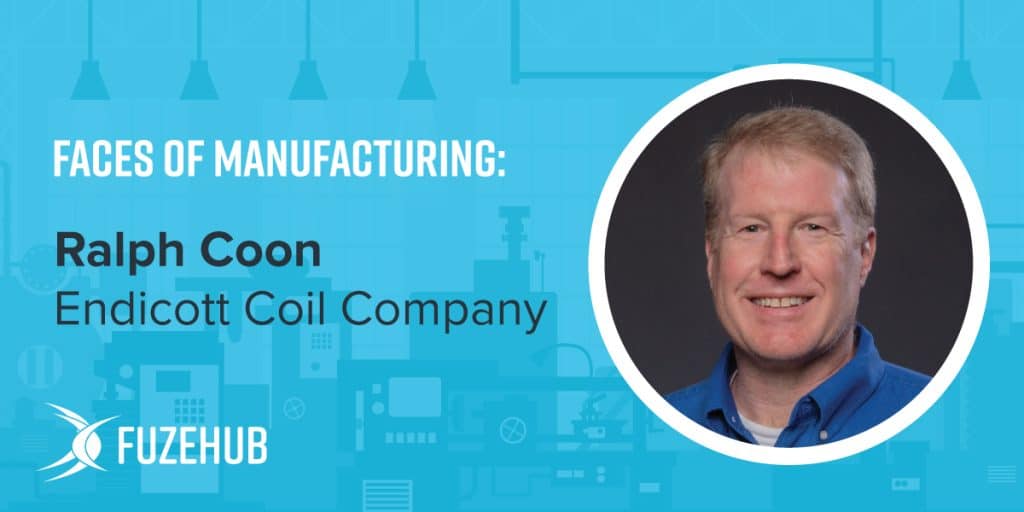Meet Edicott Coil Company
Endicott Coil Co. (ECC) is a Binghamton-based supplier of coils, transformers, and inductors for a variety of markets, including medical, nuclear, and defense. The family-owned company is celebrating its 70th birthday this year, with a story that reflects the history of the Southern Tier and proves ECC to be a model of both resilience and consistency.
“This company has gone through some tougher times,” said President Ralph Coon. “But the owners are very committed to the Southern Tier, honoring the legacy their parents invested in and making sure it continues well into the future.”
Building on relationships
ECC was born as an offshoot of IBM and was originally contracted to make reed relay coils for circuit boards. This close collaboration lasted more than a decade, as both companies grew.
Exact dates are unknown, but at some point early on, ECC’s founder retired, and Abe Piaker, an accountant renting office space at ECC’s plant, along with his brother Phil, agreed to purchase the company and take over its leadership. Ownership is now in the hands of their descendants, along with members of the Smyk, Becker, Jackson, and Foldes families, most of whom still call the Southern Tier home.
Over the years, ECC has diversified its client base, products and capabilities. Today it is a multi-faceted supplier that works closely with customers to design and build parts that meet niche needs. “We fill all those little holes in your product showcase where people might not want to play,” Coon said.
Coon joined ECC a year ago, bringing three decades of industrial experience. He “cut his teeth” at GE, he says, but found himself gravitating toward environments, like ECC, that allow for a more personal touch. ECC employs about 70 people, and he knows everyone by name.
“That is how I like to manage things,” he said.
A forced evolution
ECC’s progression from a sub-supplier for IBM to a main supplier for a client list that includes SpaceX, Parker, Valcor and Westinghouse was something of a “forced evolution,” Coon said. In its early days, the company operated by selling large numbers of lower-priced components.
“What they looked for back then was ‘give me more volume and I’ll keep turning out widgets,’” he said. “But we all know the story. In the late ’80s and early ’90s it became a race to the bottom in pricing. IBM was divesting out of the area, which created turmoil both in the community and the product line. The pressures made them rethink who they were as a company.”
The result was a shift from high-volume, commoditized items to “high-mix low-volume” manufacturing where ECC could differentiate itself as a highly responsive, value-added supplier.
“Ultimately, our quality is focused on being there to support in the design, in the first pieces, in the R&D,” Coon said. “We’re there at the production level and you can count on us for short lead times and quality parts when you need them.”
The company still makes some commoditized components but has shifted much of that work to an exclusive manufacturing partner. It will manage that process for clients who want lower costs and are willing to accept a longer lead time.
“We’re a one-stop shop.” Coon said. “It is part of protecting the business you have while you’re trying to grow in other ways.”
New Horizons
Over the years, ECC’s resilience has been tested not only by economic challenges but by rapid changes in technology, most notably the shift from coils to solid-state boards.
“There is a break point somewhere in the product life cycle where it goes obsolete because the product is not tech-forward any longer,” Coon said. “We’ve lost six-figure accounts at the drop of a hat. That doesn’t mean we don’t have opportunities in those products. It means you’re back at the start of the life cycle where you must make a new design, prove it out, make sure you’re the preferred vendor, all those good things.”
Coon envisions a future in which ECC continues to focus on those niche products with “fairly low volume, complexity and a need for precision” while also growing vertically.
“We will probably move away from coils into sub-supply, sub-assembly of small boards and simple control units,” he said. “We think that is a good avenue to grow some value. Most of our clients use those, and they are part of what we design for, so we understand them. There is a good possibility we will move in that direction to expand our horizons.”

